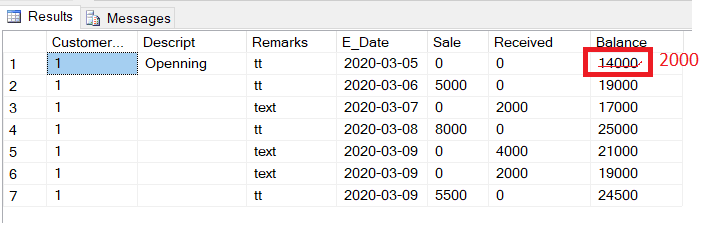Your query was getting more than one opening row per customer and then getting the sum of all those opening rows. You only want one opening row per customer. In the code below, I changed the line following the Union All in cte1 to
select distinct 0,a.Customer_id,'Openning' Descript,'', dateadd(day,-1,@begin_date) E_Date,0 Payable,0 Received, b.opening Balance
I also added an order by to the final select in the query. That changes your code to
declare @begin_date date = '2020-03-06';
declare @end_date date = '2020-03-11';
with cte as (
select inv_ID, Customer_id ,'' Descript,Inv_Rmk ,E_Date,Convert(VARCHAR(50),rec_amount) Payable,'' received
from #tbl_Shop_InvM
where #tbl_Shop_InvM.Customer_ID=1 and (Inv_Type='Payable' ) --and Inv_Del is null
--and (E_date between @begin_date and @end_date)
union
select rec_id inv_ID,Customer_id ,'' Descript,rec_rmk Inv_Rmk,rec_date E_Date,'' Payable,Convert(VARCHAR(50),rec_amount) received
from #tbl_Receivable
where #tbl_Receivable.Customer_ID=1 and (Inv_Type='Received' ) --and Rec_Del is null
-- and (Rec_Date between @begin_date and @end_date)
),cte1 as (
select *,Payable+ received*-1 balance from cte
union all
select distinct 0,a.Customer_id,'Openning' Descript,'', dateadd(day,-1,@begin_date) E_Date,0 Payable,0 Received, b.opening Balance
from cte a
inner join #tbl_Customer b on a.Customer_ID=b.Customer_ID
),
cte2 as (
select Customer_id,Descript,Inv_Rmk,E_Date,Payable,Received,
sum(balance) OVER (PARTITION BY Customer_id ORDER BY e_date,inv_ID ROWS UNBOUNDED PRECEDING) Balance
from cte1)
,cte3 as
(select Customer_id,'Openning' Descript,Inv_Rmk, E_Date,0 Payable,0 Received, Balance
,ROW_NUMBER() OVER(PARTITION BY Customer_id ORDER BY (select null)) rn
from cte2
where E_Date < @begin_date)
select Customer_id,Descript,Inv_Rmk as Remarks,dateadd(day,-1,@begin_date) E_Date,Payable as Sale,Received,Balance from cte3 where rn=(select max(rn) from cte3)
union all
select * from cte2 where E_Date between @begin_date and @end_date Order By Customer_ID, E_Date
Tom
